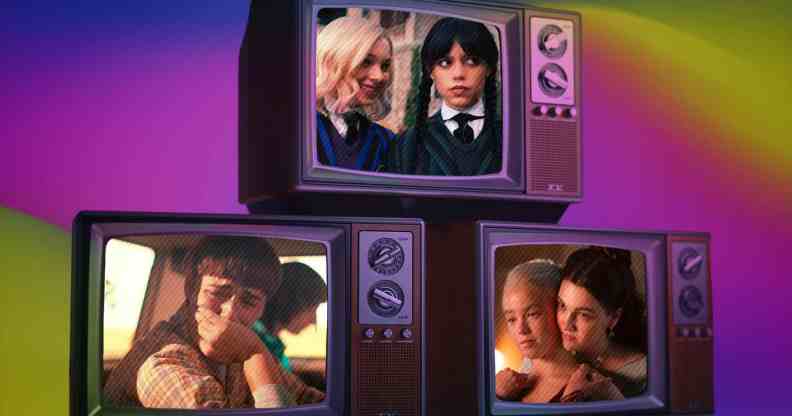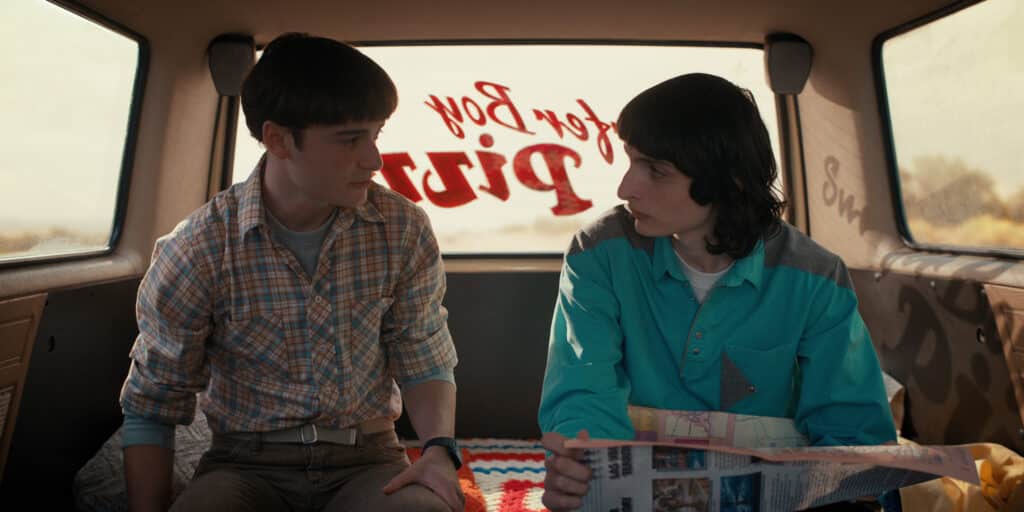TV continues to fail LGBTQ+ viewers – and Wednesday is just another example

Wednesday, Stranger Things and House of the Dragon have all been let downs. (HBO/Netflix/Envato)
While 2022 provided meaningful LGBTQ+ TV shows, from Heartstopper to Big Boys, it was a year of immense letdown – and Wednesday is another example.
Back in August, huge debate was sparked when Netflix pulled its sapphic fantasy show First Kill, the latest in a swathe of queer cancellations.
Throughout the year the LGBTQ+ community has suffered blow after blow when it comes to cancellations, often targeting series that offer seldom given representation.
Alongside this, there has been relentless discourse about queerbaiting, with many shows merely hinting at queerness. It’s a charge now being levelled at Wednesday, the new Netflix series.
Queerbaiting is a marketing technique used in the media and entertainment landscape to attract LGBTQ+ fans without actually providing them with the full representation they have been teased.
It was a common tactic in the past decades, often coming hand in hand with other harmful tropes such as “bury your gays” or demonising trans characters. It can be spotted in LGBTQ+ TV shows such as The 100, Buffy The Vampire Slayer (Buffy and Faith’s relationship)and even Sherlock.
TV has mostly moved on from this era. But in many big-budget shows, queerness remains something that is hinted at or confirmed off the page. Shows that have fallen into such traps include Stranger Things, House of the Dragon and now, Wednesday.

Fans have picked up on Will and Mike’s relationship in the latest season of Stranger Things. (Netflix)
Before its launch, Netflix threw a “WednesGay” party featuring queer performers and drag queens, so clearly it’s hoping an LGBTQ+ audience tunes in. And yet, none of the major characters are confirmed as queer.
However, fans have picked up on the very obvious queer coding between Wednesday (Jenna Ortega) and her roommate Enid Sinclair (Emma Myers).
Both characters are given male romantic interests but fans are clamouring for “Wenclair” (their ship name) to be made canon in the second season.
This isn’t to say that close friendships cannot exist between people on TV.
Myers took to the record in an interview to say: “You know what I always say, and they were roommates”, referencing a popular meme indicating two people are obviously romantically involved.
She continued: “Jenna and I would say that all the time to each other. And that’s all that needs to be said – I think that gets the message across.”
Noticing a theme? Of course, this isn’t to say that close friendships cannot exist between people on TV, it is about how they are portrayed and written.
In a year where homophobia and transphobia have been on the rise, bold and clear representation in LGBTQ+ TV shows has never been more important.
From the ongoing mainstream media debate on the existence of trans people to the biggest sporting event of the year, the FIFA Qatar World Cup, being held in an anti-LGBTQ+ country, implying relationships, queer-coding characters and teasing that LGBTQ+ people simply need to understand the subtext is simply not good enough.
TV, film and the culture we consume are often the first points of contact for many people who are learning about different communities or seeking representation.
And often, it takes decades for queer people to win these battles when it comes to LGBTQ+ TV representation
We simply need to look at Scooby Doo’s Velma, a character the queer community has been saying is a lesbian for literally decades but was only confirmed this year.
By continuing the same toxic pattern the industry needs a wake-up call and prove that LGBTQ+ stories should be told loud and proud.
How did this story make you feel?

